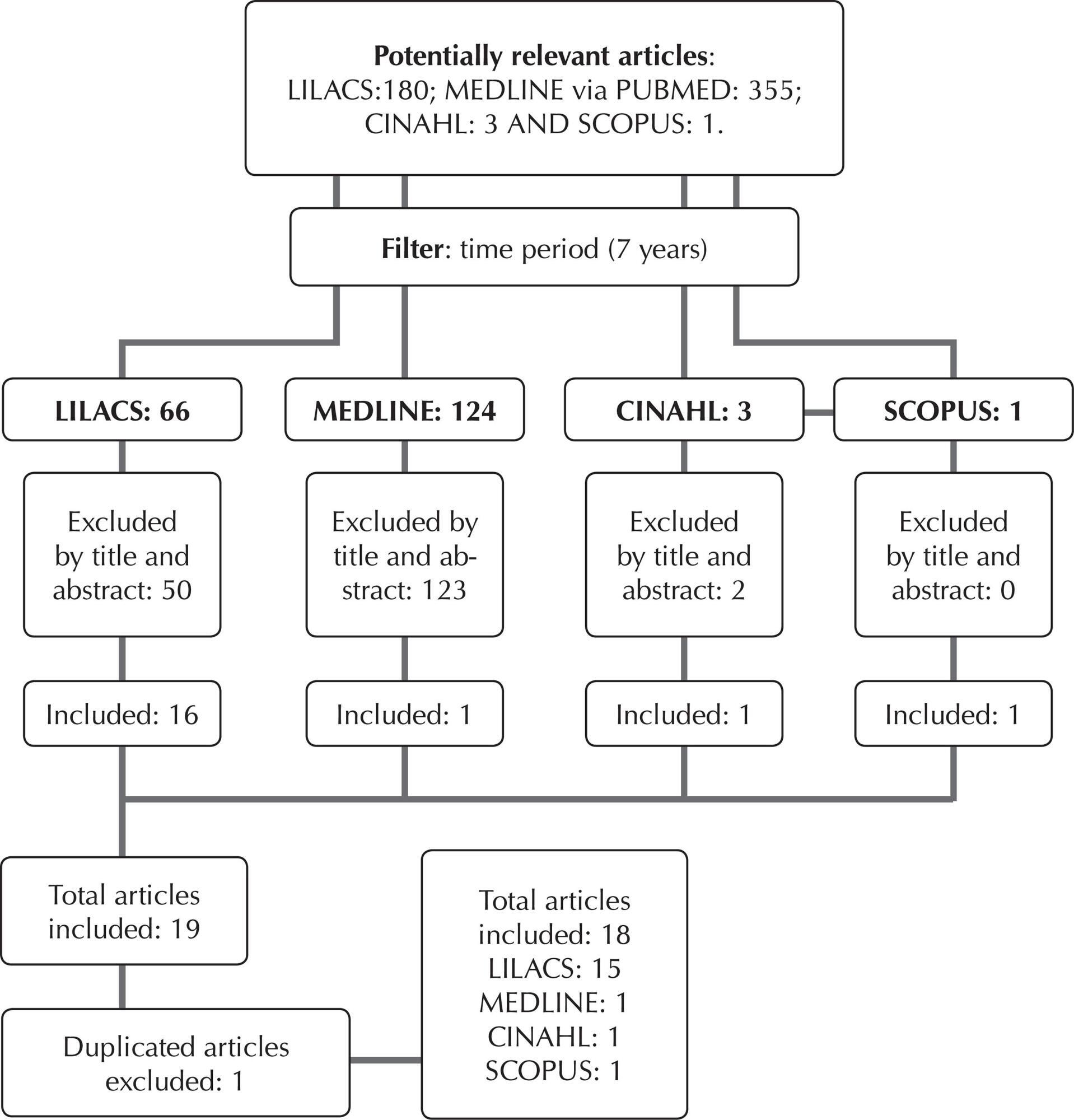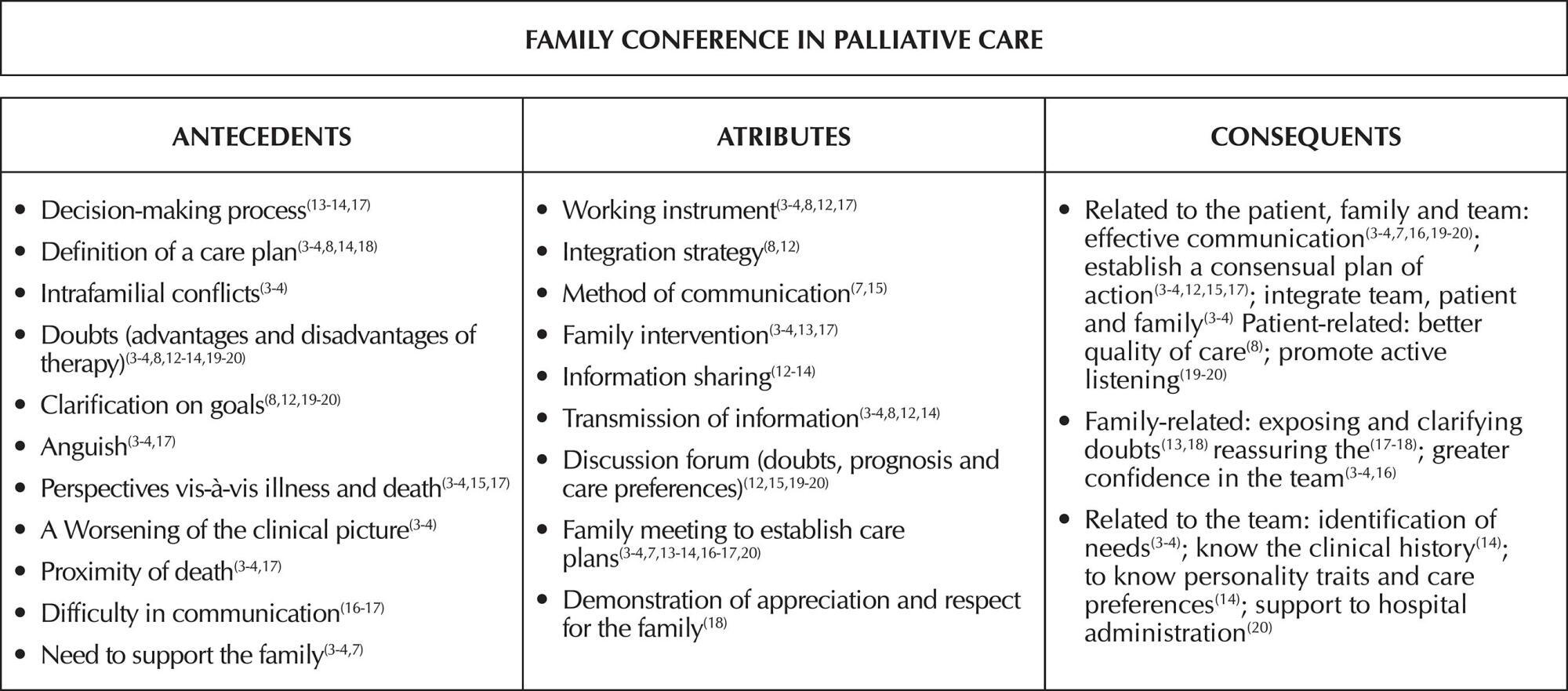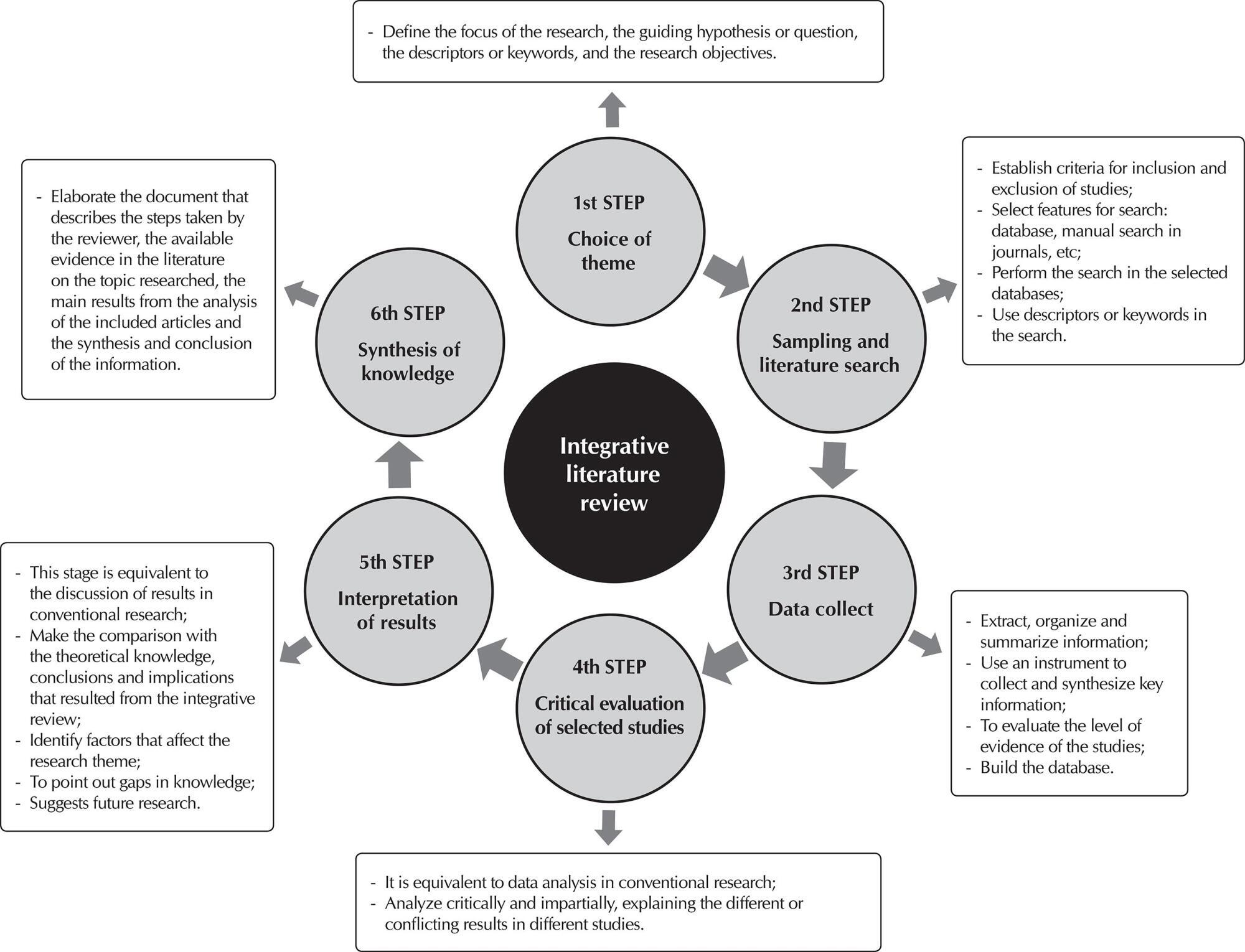-
RESEARCH01-01-2018
Primary care assessment from a male population perspective
Revista Brasileira de Enfermagem. 2018;71(2):236-243
Abstract
RESEARCHPrimary care assessment from a male population perspective
Revista Brasileira de Enfermagem. 2018;71(2):236-243
DOI 10.1590/0034-7167-2016-0651
Views1See moreABSTRACT
Objective:
to evaluate the quality of primary health care from the perspective of the male population.
Method:
a cross-sectional descriptive-evaluative study conducted at the family health units of Teresina, Piauí, Brazil, with the male population being interviewed through the Primary Care Assessment Tool (PCAT).
Results:
301 participants with mean age of 51.34 years, married, incomplete elementary school and monthly income between one and two minimum wages. The evaluation was positive for the following care domains: utilization, information system and longitudinality. The features access, comprehensiveness of care, service available and service provided, family centeredness and community orientation obtained a negative evaluation.
Conclusion:
the features of primary care are unsatisfactory, indicating the need to expand access to services offered and to qualify care for male users.
-
01-01-2018
Family and crisis: contributions of the systemic thinking for family care
Revista Brasileira de Enfermagem. 2018;71(2):234-235
Abstract
Family and crisis: contributions of the systemic thinking for family care
Revista Brasileira de Enfermagem. 2018;71(2):234-235
DOI 10.1590/0034-7167.2018710201
Views0The noun crisis comes from the Greek etymology, which means a dramatic change in a person’s or group’s life, as the familiar. It can also be perceived as a biological, social, psychological or spiritual disturbing tension that requires additional effort in order to maintain the balance(–).Families at different life cycle stages, from different configurations, and […]See more -
01-01-2018
Família e crise: contribuições do pensamento sistêmico para o cuidado familiar
Revista Brasileira de Enfermagem. 2018;71(2):234-235
Abstract
Família e crise: contribuições do pensamento sistêmico para o cuidado familiar
Revista Brasileira de Enfermagem. 2018;71(2):234-235
DOI 10.1590/0034-7167.2018710201
Views0Crise é um substantivo de etimologia grega, que pode ser explicada como sendo uma mudança brusca em algum dos aspectos da vida de uma pessoa, ou de um grupo, como o familiar. Também pode ser entendida como uma tensão perturbadora de ordem biológica, social, psíquica ou espiritual, que exige um esforço complementar para a manutenção […]See more -
EXPERIENCE REPORT01-01-2018
Theoretical saturation in qualitative research: an experience report in interview with schoolchildren
Revista Brasileira de Enfermagem. 2018;71(1):228-233
Abstract
EXPERIENCE REPORTTheoretical saturation in qualitative research: an experience report in interview with schoolchildren
Revista Brasileira de Enfermagem. 2018;71(1):228-233
DOI 10.1590/0034-7167-2016-0616
Views0See moreABSTRACT
Objective:
report the experience of applying the theoretical data saturation technique in qualitative research with schoolchildren.
Method:
critical reading of primary sources and compilation of raw data, followed by thematic grouping through colorimetric codification and allocation of themes/types of statements in charts to find theoretical saturation for each grouping.
Results:
colorimetric codification occurred according to previously established themes: bodily hydration; physical activities and play; handling of sickle-cell disease; feeding and clothing. On the eleventh interview, it was possible to reach the theoretical saturation of themes, with four additional interviews being performed.
Conclusion:
this experience report enabled the description of the five sequential steps for identification of theoretical data saturation in qualitative research conducted with schoolchildren.
-
EXPERIENCE REPORT01-01-2018
Advanced Practice Nursing in Pediatric Urology: experience report in the Federal District
Revista Brasileira de Enfermagem. 2018;71(1):223-227
Abstract
EXPERIENCE REPORTAdvanced Practice Nursing in Pediatric Urology: experience report in the Federal District
Revista Brasileira de Enfermagem. 2018;71(1):223-227
DOI 10.1590/0034-7167-2016-0654
Views0See moreABSTRACT
Objective:
To describe the creation and implementation of the extension program Advanced Practice Nursing in Pediatric Urology, developed in the outpatient clinic of a teaching hospital in the Federal District.
Method:
This is an experience report regarding the implementation of an outpatient service aimed at children and adolescents with symptoms of bladder and bowel dysfunction.
Results:
Because it is an extension program linked to the university, it follows a different model of care, valuing empowerment, informed and shared decision making, which results in a stronger bond between patients, family and the Pediatric Urology nursing team. It has also become a privileged space for the production and use of scientific knowledge, associated with the principles of evidence-based practice.
Conclusion:
This project shows a different performance of the nurse-specialist-professor-researcher in Pediatric Urology Nursing, and it has become a reference in the Federal District, mainly for undergraduate and graduate nursing students.
-
REVIEW01-01-2018
Analysis of Brazilian publications on distance education in nursing: integrative review
Revista Brasileira de Enfermagem. 2018;71(1):214-222
Abstract
REVIEWAnalysis of Brazilian publications on distance education in nursing: integrative review
Revista Brasileira de Enfermagem. 2018;71(1):214-222
DOI 10.1590/0034-7167-2016-0454
Views0INTRODUCTIONDistance Education (DE) is characterized by a teaching-learning process in which the relationship between teacher and student does not occur on physical plane. This strategy, besides allowing the use of technologies in education, stimulates multidirectional communication and the exchange of experiences/knowledge among the related subjects, while always aiming at the student as protagonist and the […]See more
-
REVIEW01-01-2018
Family conference in palliative care: concept analysis
Revista Brasileira de Enfermagem. 2018;71(1):206-213
Abstract
REVIEWFamily conference in palliative care: concept analysis
Revista Brasileira de Enfermagem. 2018;71(1):206-213
DOI 10.1590/0034-7167-2016-0055
Views0See moreABSTRACT
Objective:
to analyze the attributes, antecedents and consequents of the family conference concept.
Method:
Walker and Avante’s method for concept analysis and the stages of the integrative review process, with a selection of publications in the PubMed, Cinahl and Lilacs databases focusing on the family conference theme in the context of palliative care.
Results:
the most cited antecedents were the presence of doubts and the need to define a care plan. Family reunion and working instrument were evidenced as attributes. With respect to consequents, to promote the effective communication and to establish a plan of consensual action were the most remarkable elements.
Final considerations:
the scarcity of publications on the subject was observed, as well as and the limitation of the empirical studies to the space of intensive therapy. Thus, by analyzing the attributes, antecedents and consequents of the concept it was possible to follow their evolution and to show their efficacy and effectiveness as a therapeutic intervention.

-
REVIEW01-01-2018
Quality of life in adults with sickle cell disease: an integrative review of the literature
Revista Brasileira de Enfermagem. 2018;71(1):195-205
Abstract
REVIEWQuality of life in adults with sickle cell disease: an integrative review of the literature
Revista Brasileira de Enfermagem. 2018;71(1):195-205
DOI 10.1590/0034-7167-2016-0409
Views0See moreABSTRACT
Objective:
To identify the available evidence in the literature on health-related quality of life in adults with sickle cell disease.
Method:
integrative review of MEDLINE, CUMED, LILACS and SciELO databases, from articles developed in this area, published between 2005 and 2015, in English, Portuguese or Spanish.
Results:
22 articles were included, six scales were used to evaluate health-related quality of life scores: three generic and three specific. No specific scale for adults with sickle cell disease has been adapted to Brazilian Portuguese so far. Patients affected by frequent painful crises, with low adherence to treatment, had a compromised quality of life.
Conclusion:
Selected studies have shown that patients with sickle cell disease have worse scores than the general population. These indicators should be instrumental to the nurse in the proposal of interventions and strategies of assistance and socio-educational, with a view to improving the quality of life of this clientele.

-
08-19-2019
Degree in Nursing: education through problem-based learning
Revista Brasileira de Enfermagem. 2019;72(4):1071-1077
Abstract
Degree in Nursing: education through problem-based learning
Revista Brasileira de Enfermagem. 2019;72(4):1071-1077
DOI 10.1590/0034-7167-2018-0298
Views0See moreABSTRACT
Objective:
To describe how undergraduate courses in Nursing are using the problem-based learning (PBL).
Method:
Integrative literature review, from searches in the databases Education Resources Information Center (ERIC), Latin American and Caribbean Health Sciences Literature (Lilacs), and PubMed, from 2010 to 2015. 36 articles were analyzed.
Results:
A teaching method used in all continents, the PBL enables improvement of the critical thinking, autonomy, motivation for learning, active search attitude, ability to work in teams, and problem-solving. Difficulties and challenges relate to the training of students and teachers to understand the principles of the method.
Final considerations:
The benefits of PBL coincide with the needs of nursing training, but its applicability demands constant review in seeking to develop the skills necessary for this training.

-
ORIGINAL ARTICLE10-23-2020
Building and validating an educational video for elderly individuals about fall risks
Revista Brasileira de Enfermagem. 2020;73:e20200010
Abstract
ORIGINAL ARTICLEBuilding and validating an educational video for elderly individuals about fall risks
Revista Brasileira de Enfermagem. 2020;73:e20200010
DOI 10.1590/0034-7167-2020-0010
Views0See moreABSTRACT
Objective:
to build and validate educational video for elderly individuals about fall risks.
Methods:
methodological study with video building. validated by 22 judges and assessed by 22 elderly individuals. Content was selected from the Fall Prevention Model and items from the Falls Risk Awareness Questionnaire. Items with an agreement greater than 0.80 were considered valid. verified through Content Validation Index (CVI) and binomial test.
Results:
building the video was guided by the Cognitive Theory of Multimedia Learning. Digital animation and audio narration were used. It lasted ten minutes and five seconds and included biological. socioeconomic. behavioral and environmental risks as well as precautions to avoid them. The CVI of judges had an average of 0.99. and of elderly individuals. an average of 1.0.
Conclusion:
the video was built and validated for content and understanding and can be used to prevent falls in elderly individuals.

-
ORIGINAL ARTICLE06-01-2020
Construction and validation of an educational technology for mother-child bond in the neonatal intensive care unit
Revista Brasileira de Enfermagem. 2020;73(4):e20190083
Abstract
ORIGINAL ARTICLEConstruction and validation of an educational technology for mother-child bond in the neonatal intensive care unit
Revista Brasileira de Enfermagem. 2020;73(4):e20190083
DOI 10.1590/0034-7167-2019-0083
Views0See moreABSTRACT
Objectives:
to describe the process of construction and validation of an educational booklet to promote bonding between mothers and newborns in a Neonatal Intensive Care Unit.
Methods:
methodological study developed through data collection in the literature and with the target audience; construction of the booklet; qualification of the material through validation by judges (health and communication experts/designer) and assessment by the target audience (mothers of at-risk newborns). Data were analyzed descriptively.
Results:
booklet content was validated, obtaining an overall Content Validity Index of 0.92. Appearance was rated “Superior” with 80% percentage. Mothers performed an assessment with 100% agreement between the items.
Conclusions:
the booklet was validated in all domains assessed and can be used by mothers with children hospitalized in the Neonatal Unit.

-
ORIGINAL ARTICLE07-10-2020
Profile of nursing students: quality of life, sleep and eating habits
Revista Brasileira de Enfermagem. 2020;73:e20190365
Abstract
ORIGINAL ARTICLEProfile of nursing students: quality of life, sleep and eating habits
Revista Brasileira de Enfermagem. 2020;73:e20190365
DOI 10.1590/0034-7167-2019-0365
Views0See moreABSTRACT
Objective:
to profile and analyze sleep quality, quality of life and eating habits of nursing students.
Methods:
a cross-sectional, comparative and correlational study with the following variables: sociodemographic characteristics, Pittsburgh sleep quality index, quality of life and eating habits. One hundred ninety-five students participated in the study.
Results:
participants were on average 24 years old. Results showed that females were prevalent (87.1%); 71.0% of the students had poor sleep quality; 98.9% used electronic devices before bedtime. Self-perception of quality of life was indifferent (38.3%), and self-perception of general health, 36.9% expressed satisfaction. Among the participants, 45.13% consumed one portion of fruit and 40.66% two to three portions of vegetables daily.
Conclusion:
the study allowed the profile of these students, sedentary, overweight and poor sleep quality young students who studied and worked.

-
ORIGINAL ARTICLE08-19-2019
Mobile application for the teaching of the International Classification for Nursing Practice
Revista Brasileira de Enfermagem. 2019;72(4):1020-1027
Abstract
ORIGINAL ARTICLEMobile application for the teaching of the International Classification for Nursing Practice
Revista Brasileira de Enfermagem. 2019;72(4):1020-1027
DOI 10.1590/0034-7167-2018-0751
Views0See moreABSTRACT
Objective:
Developing a mobile application for the teaching of the International Classification for Nursing Practice.
Methods:
Methodological applied research for technological production, performed in three phases of the contextualized instructional design model: analysis, design and development.
Results:
The application has an initial screen, which provides information about the team and its purpose. Then, four moblets are listed, including presentation, user’s guide consisting of five modules, educational games and five clinical cases. The references on which the application was based are also presented.
Final considerations:
It was possible to develop an application with the potential to promote the knowledge of nursing students and professionals about this classification system.

-
REFLECTION06-29-2020
Children’s (in)visibility in social vulnerability and the impact of the novel coronavirus (COVID-19)
Revista Brasileira de Enfermagem. 2020;73:e20200302
Abstract
REFLECTIONChildren’s (in)visibility in social vulnerability and the impact of the novel coronavirus (COVID-19)
Revista Brasileira de Enfermagem. 2020;73:e20200302
DOI 10.1590/0034-7167-2020-0302
Views0See moreABSTRACT
Objective:
To examine the impact of the infection by the novel coronavirus on Brazilian children in situation of social vulnerability based on the Millennium Sustainable Development Goals.
Method:
Reflective study based on discursive formulation in three aspects: principles of the objectives and goals for the millennium sustainable development; impact of the pandemic on the health of children and their families living in social vulnerability; and the role of pediatric nursing in the care provided – limits and challenges.
Results:
In January 2020, the news of COVID 19 is released as a pandemic. In Brazil, children and families are still without access to basic rights, thereby increasing their risks of social vulnerability because of the quarantine. The nursing field has an important role in monitoring children and their families, offering guidance in search for solutions and preventing contamination.
Conclusion:
There are still challenges to be overcome by the children and their families in situations of vulnerability against COVID-19.
-
REFLECTION03-05-2021
The nurse’s work in the context of COVID-19 pandemic
Revista Brasileira de Enfermagem. 2021;74:e20200594
Abstract
REFLECTIONThe nurse’s work in the context of COVID-19 pandemic
Revista Brasileira de Enfermagem. 2021;74:e20200594
DOI 10.1590/0034-7167-2020-0594
Views0See moreABSTRACT
Objective:
Reflect on the work experienced by the nurse in coping with the COVID-19 pandemic in a public hospital of the State of Rio Grande do Norte.
Methods:
Reflective essay based in the professional experience in a public reference hospital for the care of patients affected by COVID-19 in the State of Rio Grande do Norte. Results were organized in two empirical categories, which emphasize potentialities and barriers in the nurse’s work in the face of the COVID-19, presented by means of Ishikawa diagram.
Results:
Two categories emerged from the experiences: Nursing leadership in organizing health services to face COVID-19; and the performance of nursing care management in the COVID-19 pandemic.
Final considerations:
It is necessary to value the nurse’s work in all its attributes, as well as strengthen the interdisciplinary work processes, which collaborate to overcome the crisis caused by the pandemic.

-
ORIGINAL ARTICLE03-30-2020
Clinical simulation in teaching Pediatric Nursing: students’ perception
Revista Brasileira de Enfermagem. 2020;73(2):e20180720
Abstract
ORIGINAL ARTICLEClinical simulation in teaching Pediatric Nursing: students’ perception
Revista Brasileira de Enfermagem. 2020;73(2):e20180720
DOI 10.1590/0034-7167-2018-0720
Views0See moreABSTRACT
Objectives:
to comprehend the perception of undergraduate nursing students about learning to care for the child and family through clinical simulation.
Methods:
this is a qualitative research conducted with ten nursing students through semi-structured interviews. Data were analyzed through content analysis.
Results:
data were organized into two categories: “learning a new way to learn,” in which students describe their experiences during the simulation, and “learning a new way to care,” in which they reflect on learning through simulation.
Final considerations:
we believe that clinical simulation practice in teaching should be encouraged because of the benefits it can offer to the students, faculty, patients and their families. However, we recommend further studies to validate scenarios of child and family healthcare.
Search
Search in:
Nuvem de Tags
Adolescente (85) Atenção Primária à Saúde (239) COVID-19 (91) Criança (91) Cuidados de Enfermagem (269) Educação em Enfermagem (151) Educação em Saúde (139) Enfermagem (930) Enfermagem Pediátrica (86) Estudantes de Enfermagem (77) Estudos de Validação (131) Família (87) Idoso (208) Promoção da Saúde (99) Qualidade de Vida (104) Saúde do Trabalhador (86) Saúde Mental (145) Saúde Pública (82) Segurança do Paciente (150) Tecnologia Educacional (100)



